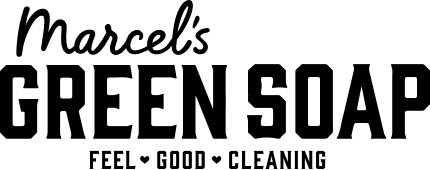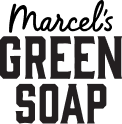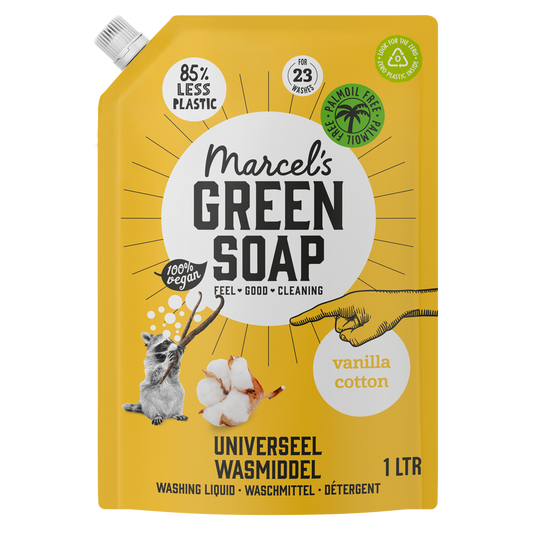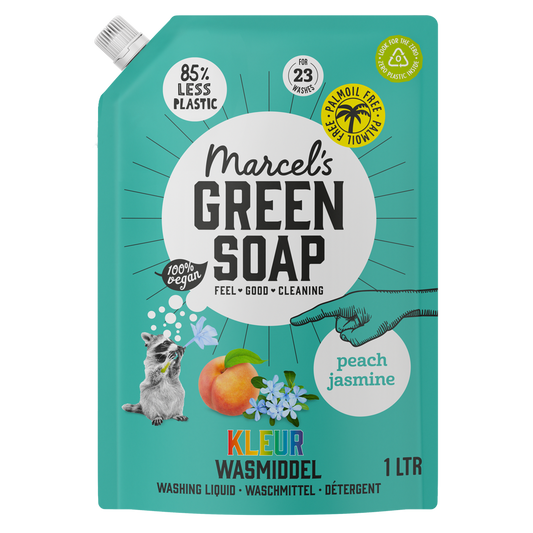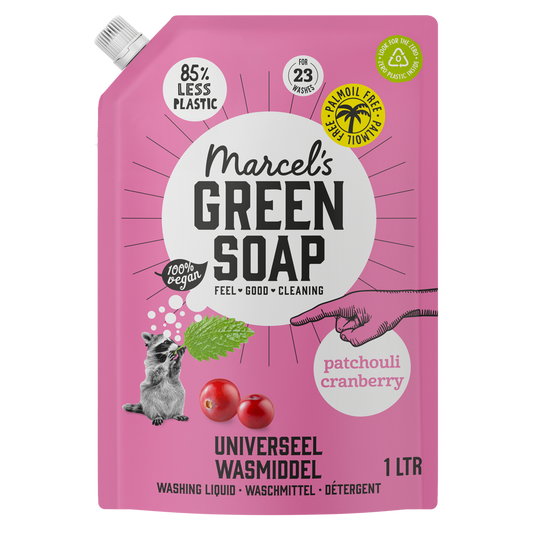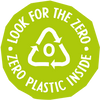In conversation with Eefje – product developer at Marcel's Green Soap. Four eco-friendly cleaning products in four different scents. That's how Marcel started his brand and mission five years ago. The assortment has now expanded to 52 products in nine different categories. Every day, we are busy developing new products. Eefje, product developer at Marcel's Green Soap, has a nose for delightful scents and product trends. She tells us all about the process of developing new products (and scents).
How do you become a product developer at Marcel's Green Soap?
Eefje worked for over twenty years at various cosmetic companies and manufacturers before crossing paths with Marcel. He asked her to join Marcel's Green Soap as a product developer. She has been working there for over 3.5 years now. "It's an honorable job," as she calls it. Eefje has an innate curiosity about raw materials and product compositions, but she especially loves scents. With her work experience in various perfumeries, she knows which scents are popular. And that knowledge comes in handy in her role at Marcel's Green Soap because our first promise to the consumer is that our products smell delightful.
How do you come up with the idea for a new product?
Dishwashing liquid, hand soap, all-purpose cleaner, and all-purpose cleaner spray. With these four products, Marcel made his debut in the cleaning aisle five years ago. He started with four somewhat unusual but delightful scent combinations: orange & jasmine, lavender & rosemary, radish & bergamot, and basil & vetiver. This tasted – or rather, smelled – like more. The cleaning assortment was expanded to include dishwasher tablets, toilet cleaner, and palm oil-free laundry detergent. And a personal care line was introduced with shampoo, shower gel, and more. All of this in twelve different scents. For the development of these products, he enlisted the help of product developer Eefje. We asked her: how do you come up with the idea for a new product?
"We are always looking for opportunities in the aisle for sustainable products. Sometimes there's a concrete demand for a certain product from the consumer, sometimes it's just a gut feeling." At Marcel's Green Soap, we focus on the light green consumer. This consumer group makes up sixty percent of our population, the majority. The light green consumer is willing to buy sustainable products, as long as there are little or no compromises on the quality, price, and – very important – the experience of the product. When we develop a new product, we look at trends but above all, listen to what the consumer wants. Because the sustainable market is changing rapidly. Where the light green consumer wasn't ready for solid shampoo, the shampoo bar, five years ago, the demand is now greater than ever.
"Most of our products are manufactured in the Netherlands, so I can, figuratively speaking, ride my bike to the factory."
Eefje: "Because we have short lines with the manufacturers, we can act quickly. Most of our products are manufactured in the Netherlands, so I can, figuratively speaking, ride my bike to the factory. This way, we can turn an idea into a new product in a short time. This allows us to quickly respond to trends and always stay a few steps ahead of other brands."
What are the requirements for a Marcel's Green Soap product?
Marcel makes three promises to the consumer: Marcel's Green Soap smells fantastic, works well, and is eco-friendly. Every new product we develop must meet these promises. We are therefore constantly looking for sustainable alternatives to existing formulations without the consumer having to compromise on the quality, price, and experience of the product. Eefje: "For every new product we develop, it must be 100% vegan, at least 97% biodegradable, packaged in plastic-free or 100% recycled plastic, and palm oil-free where possible."
How do you develop a new product?
When Eefje has an idea for a new product, she collaborates with the factory. "I indicate which ingredients I want in it and what requirements the product must meet; the factory then helps with the formulation, taking into account regulations." The formulation is the composition of a product. And that's quite delicate. Some ingredients have a negative effect on each other, causing the product to fall apart or – worse – start to smell. That's why we mix and match until we find the right composition. After the product is fully developed, it undergoes extensive testing before hitting the shelves. A safety assessor looks at the substances used, the interaction with the packaging, and whether the product stays intact. Such a testing phase lasts three months.
"In total, it takes about nine months to develop a new product, including the three-month testing phase."
Once the formulation is determined, the cost price can also be calculated. Eefje: "Price is very important to us. We want the product to be affordable for as many people as possible. Sometimes we want to develop a product that ultimately turns out to be too expensive; then we don't do it." For example, last year Eefje was working on developing Marcel's Green Soap scented candles. These require petroleum, a non-renewable resource for which no environmentally friendly and affordable alternative has been found yet. That's why we choose not to introduce this product to the market for the time being.
Before a new product hits the shelves, there are still a few steps to take. First, the packaging. Eefje: "For our products, we have developed our own molds. This gives our products a unique shape, and we don't have to develop a new packaging for each product. Only the label needs to be designed." Fun fact: for some of our cleaning products, we use 'old' molds that were still on the shelf at the manufacturer. That's why Marcel's Green Soap laundry detergent is packaged in the shape of an oil bottle, and our dishwashing liquid is packaged in an old Pokon bottle. All made from 100% recycled plastic, of course.
In the final stage of product development, we work on the marketing, or how do we bring the product to the market? Eefje: "In total, it takes about nine months to develop a new product, including the three-month testing phase."
And what about developing a new scent(line)?
Eefje: "Scent is emotion. People buy Marcel's Green Soap not only because it's eco-friendly but also because it smells good." Eefje would ideally develop a new scent line every month, but this is much more complicated than developing a new product. "Scent has a significant impact on the formulation of a product. For our laundry detergent, we tested various scents before finding one that didn't fall apart and stayed on clothes."
"Scent is emotion. People buy Marcel's Green Soap because it's eco-friendly but also because it smells good."
Developing a new scent takes a lot of time, but Eefje is always looking for surprising scent combinations. Eefje: "You have several scent families, and if you cover all of these scent families, there's something for everyone. When I started working at Marcel's Green Soap, I missed a floral scent. Together with the perfume house, I searched for a flowery scent combination. I indicate which natural scents I want in it, and they then make the samples. We then have them extensively tested." The vanilla-cherry blossom scent came out on top, and we now have several personal care products in this spring-like floral scent.
How difficult (or easy) is it to develop a green product?
Developing a product that smells good, feels pleasant, works well, is eco-friendly, and affordable. That sounds like a challenge. Eefje: "We are constantly looking for the balance between affordability, sustainability, and quality." And that's not always easy because even though more and more sustainable alternatives are being found for environmentally harmful raw materials, these are often much more expensive. Moreover, 'green' raw materials sometimes have their downsides too.
Eefje: "There is a big difference between sustainable and natural. Natural is not always sustainable and vice versa." So at Marcel's Green Soap, we mainly use synthetic instead of natural fragrances. Eefje: "For natural fragrances, you need to extract a relatively large amount of raw materials from the earth. This is not necessary for our synthetic fragrances. Moreover, with synthetic fragrances, you have more control over biodegradability, allergens, and quality. Natural fragrances can be contaminated, causing a product to suddenly smell different – less pleasant. We don't want that. With synthetic fragrances, the experience and quality are always the same. I'd rather make a shampoo bar with synthetic components that are environmentally friendly and nice to use than a natural one that doesn't work well or smells less pleasant and therefore sells poorly. Then we still miss our goal."
"There is a big difference between sustainable and natural. Natural is not always sustainable and vice versa."
All our products are 100% vegan, meaning we don't use any animal-derived ingredients. So beef fat, which is often used in fabric softeners, doesn't come into play for us. And for our solid soap products – shampoo and conditioner bars – we use cetearyl alcohol (a fatty alcohol from vegetable oils) instead of pork fat.
Replacing palm oil is a new challenge. The demand for palm oil is high worldwide. This is logical because it can be used for many things, requires relatively little and is also reasonably cheap. But palm oil production requires the clearing of rainforests. That's why we're eager to look for alternatives. Some products in our range are made with palm oil from RSPO-certified suppliers or are already palm oil-free. For example, we recently developed the first liquid palm oil-free laundry detergent in the Netherlands. This was a challenge because palm oil helps a product feel soft and dissolve dirt. Yet we succeeded, and we're proud of that. Read more about our palm oil-free laundry detergent and why it's a challenge to find a good substitute for palm oil.
Another challenge is replacing sulfates. Eefje: "Sulfate makes a product foam and clean well. But this raw material has a negative association, not because of the environment, but because it's believed to dry out your hair and skin. Our shampoo bars are already sulfate-free and still foam wonderfully. We also want to make our other products sulfate-free in the future."
What products are you currently developing?
Meanwhile, Eefje is already busy developing new products such as Marcel's Green Soap deodorant roller, scent sticks, and shampoo bars for different hair types. And behind the scenes, she's sniffing various scent samples, looking for a new scent line. She already has a favorite, but whether it will be chosen... We'll have to wait and see.
